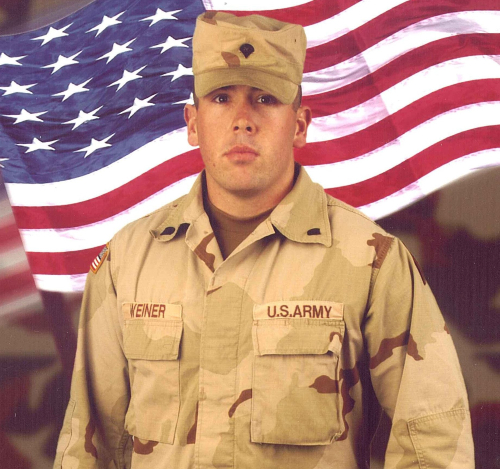Connecting on a New Level: Warrior Embraces Gaming, Rediscovers Camaraderie

Video games are more than a way to pass the time for Army veteran Dave Weiner. In a way, they saved his life. As the pandemic became widespread, Dave’s PTSD and anxiety flared. He felt alone. But things changed when he signed up for a Wounded Warrior Project® (WWP) online gaming event. He discovered hope, a chance to heal, and most importantly, a community of people who understand the things he’s been through.
When he joined the Army in 2003 and deployed to Iraq a year later, Dave heavily got into playing video games. As Dave described, during deployment, there are three things in the MWR (morale, welfare, recreation) tents: dominoes, spades, and video games.
“Having video games as an outlet to blow off steam is tremendous,” Dave said.
Veterans have a specific style of communication — and when they’re on the battlefield, or virtual battlefield in a game, they can quickly connect and reach goals together because they all understand each other.
When Dave was in the Army, his helicopter took a steeper incline after a rocket-propelled grenade flew by. Dave fell out and landed on his back. He didn’t pay much attention to the pain that ensued because he was fatigued from doing 18- to 20-hour missions. Six months later, in 2005, he returned stateside. He found it challenging to get medical care since his injury wasn’t reported immediately. He also began experiencing symptoms of PTSD. Once he was medically retired in 2009, Dave went through physical therapy and began healing his visible wounds.
But the PTSD, anxiety, and sense of loss of community remained — until he discovered WWP’s Discord server at that gaming event he attended amid the COVID-19 pandemic. Discord offers chat rooms and audio channels where warriors can talk with one another as they’re gaming. WWP staff are also frequently on the server, serving as a listening ear or a resource for getting help.
On Discord, Dave found others who speak the same language as him, who have experienced the same things.
“Attending the Wounded Warrior Project gaming event changed everything,” Dave said. “The biggest thing about PTSD is being lonely. It’s hard to find a peer group that shares the same commonalities. Before Discord, I had no one to talk to.”
Dave said his life improved when he started livestreaming his games and interacting with other veterans. He said he’d found his group.
Without the face-to-face element in gaming, it can be more comfortable for Dave and other veterans to share feelings about difficult situations.
“It helps people get out of their shells and start talking,” Dave explained. “Once you get started talking, you just open up and feel more comfortable and keep sharing your thoughts. There isn’t someone looking at me and judging me for how my PTSD or anxiety affects me.”
Dave feels that gaming is a form of therapy.
“Once you leave the military, you lose your tribe mentality, where you know no matter what they’ll have your back,” Dave said. “You may or may not find one or two people outside the military who actually have your back. This community does that — holds you accountable. We can be totally open with each other. It’s more of a family thing where we can argue and then be fine two minutes later.
“Having a community to reach out to with people who understand is priceless.”
Using Discord and gaming gives veterans a safe space to talk with other veterans. It provides an opportunity for warriors to be themselves — to feel free.
Dave is part of WWP’s Stream to Serve™ squad. The squad is a team of supporters who raise money for WWP through livestreaming. Dave also helps run WWP’s community nights on Discord, where veterans virtually gather to play Call of Duty.
“A lot of veterans with PTSD are afraid to leave house,” Dave said. “But they miss out on talking and interacting with others. Now they can do that. This allows them to feel safe in their internal environment.”
As Dave continues his transition from the military to civilian life, he wants to help others do the same. Dave is pursuing a doctorate in business administration, focused on how veterans can transform a military mindset to the civilian sector. He ultimately wants to serve as an advocate for helping injured veterans cope with the hidden injuries of war.
“The war many veterans are fighting internally is way more difficult than a broken limb,” Dave said. “Mental health is a very hard path — there are so many complexities.”
He’s grateful to see that WWP has stepped in to fill a gap in services available to veterans — especially those of the post-9/11 generation who grew up with video games.
“It was a long overdue missing link,” Dave said. “This is one of the best things Wounded Warrior Project has ever done. It brings everyone together in one place. If anyone ever has a question or a challenge they’re facing, there is always someone to talk to. Outside of business hours for other resources, having the communal Discord space is amazing.”
Dave pointed out that ultimately, “Gaming isn’t just the game you play, it’s the relationships you form and people you talk to.”
About Wounded Warrior Project
Since 2003, Wounded Warrior Project® (WWP) has been meeting the growing needs of warriors, their families, and caregivers — helping them achieve their highest ambition. Learn more.